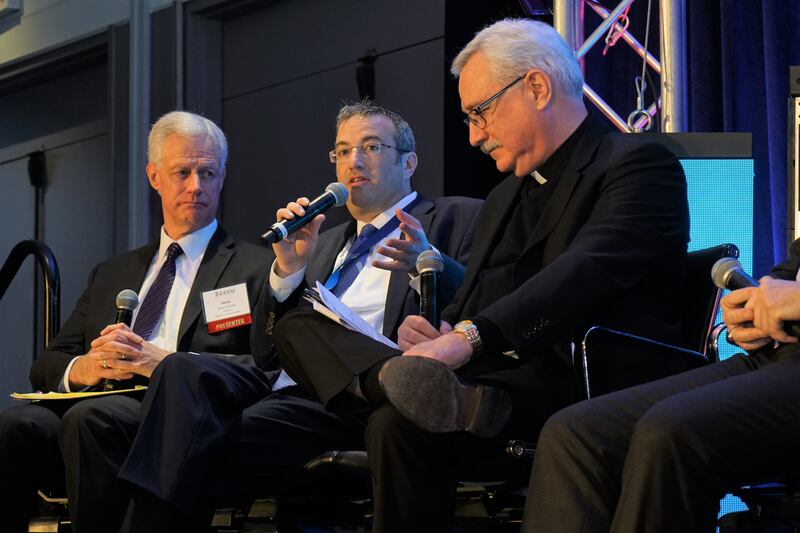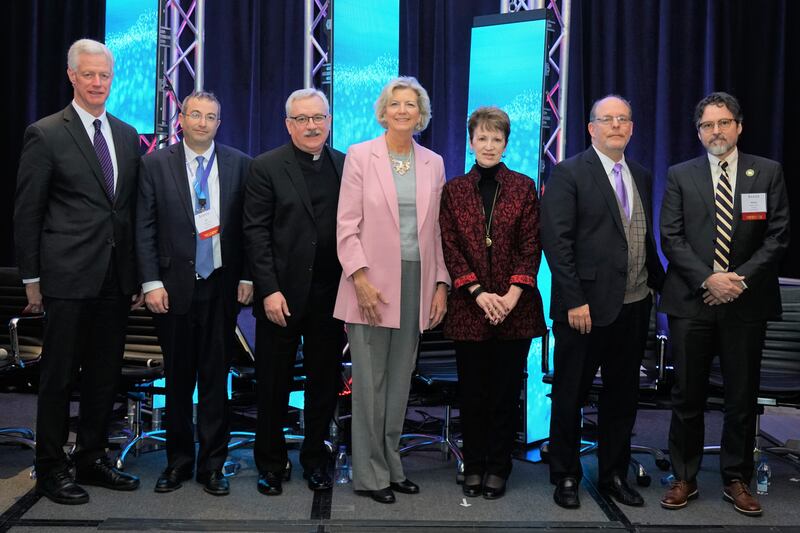WASHINGTON, D.C. — Faith-based universities are facing a public image crisis, and they need their students' help to fix it, according to leaders of Christian, Jewish and Muslim schools speaking at this week's Council for Christian Colleges and Universities presidents conference.
"There is a lot of ignorance in our culture about faith-based education. People think of it more like indoctrination," said Shirley Mullen, president of Houghton College in Houghton, New York, which is a Christian institution.
Mullen and other religious school leaders say they're more interested in producing well-rounded people than perfect Muslims, Christians or Jews. But, during an interfaith panel Friday on the value of faith-based education at the presidents conference, they agreed it's hard to convince nonbelievers, secular academics and even sometimes government officials to believe them.
For religious people — and there still are a considerable number of us around — secular institutions have become increasingly hostile. – Hamza Yusuf, president of Zaytuna College

"How can you really change that metanarrative in a world that exists in sound bites … and siloed conversations?" asked Kevin Worthen, the president of Brigham Young University. "That's one of the things we need to think very seriously about."
Today, faith-based schools face growing pressure to change, as the Deseret News reported earlier this week. Religious practice is declining, support for LGBTQ rights is rising and fewer than 4 in 10 Americans place a great deal of trust in organized religion.
Leaders of faith-based colleges and universities say, in this environment, their work is need more than ever before.
"For religious people — and there still are a considerable number of us around — secular institutions have become increasingly hostile," said Hamza Yusuf, president of Zaytuna College, a Muslim school in Berkeley, California.
Religious schools are a safe space for religious young people, and they also help students become thoughtful participants in a diverse world, noted the Rev. John Fitzgibbons, who is president of Regis University, a Catholic school in Denver.
"I think a university needs to be a sacred space. That is not a throwaway word. What happens in a university is that human beings become what God intends them to be," he said.
Contrary to people's assumptions, faith-based colleges and universities are well-equipped to have difficult conversations about faith, Mullen said. Students wrestle with their religious convictions and are better for it in the end.
We provide "a kind of education that does not require students to leave behind their fundamental convictions … as they deepen their intellectual understanding," she said.
During the interfaith panel, university leaders discussed the best path forward in an increasingly hostile world. It's important for leaders at religiously affiliated universities to work with each other and learn from one another, they said.
"In the polarized world in which we live, if we didn't do anything more than provide significant evidence that this is possible to do, we would have more than justified all the efforts that have gone into putting (this panel) together," Worthen said.
In addition to leaning on each other, religious school leaders need to call on their students to help them improve their schools' reputations, Mullen said. Graduates can go out into the world and show they're not afraid of religious difference or tough conversations about their faith.
I think a university needs to be a sacred space. That is not a throwaway word. What happens in a university is that human beings become what God intends them to be. – The Rev. John Fitzgibbons, president of Regis University
They can "embody a vision of faith and life that does not fit the stereotype that everyone is afraid of," she said.
Diane Jones, principal deputy undersecretary at the U.S. Department of Education, shared her support for this approach earlier in the conference during a discussion of the government regulations affecting campus life.
She urged religious school leaders to "tell your story, show the good results and engage your students in telling the story."
If this approach is successful, faith-based schools will stop being seen as a site of indoctrination and start being celebrated for building a healthier society, Mullen said.
"We offer to our society the possibility of a new story … where faith brings not intolerance, not conflict, not oppression, but space for dialogue, justice, reconciliation and restoration of human dignity and human flourishing," she said.



